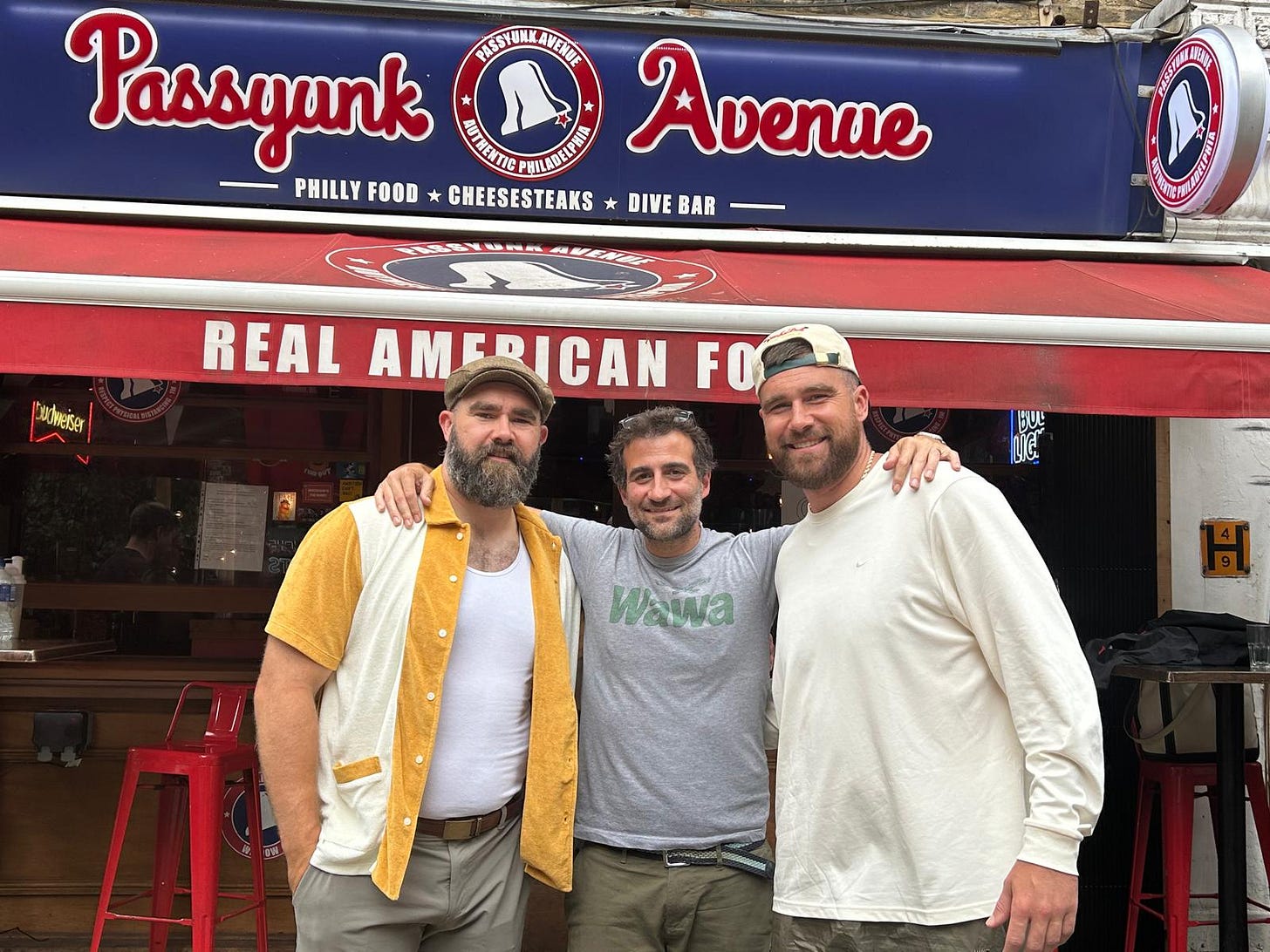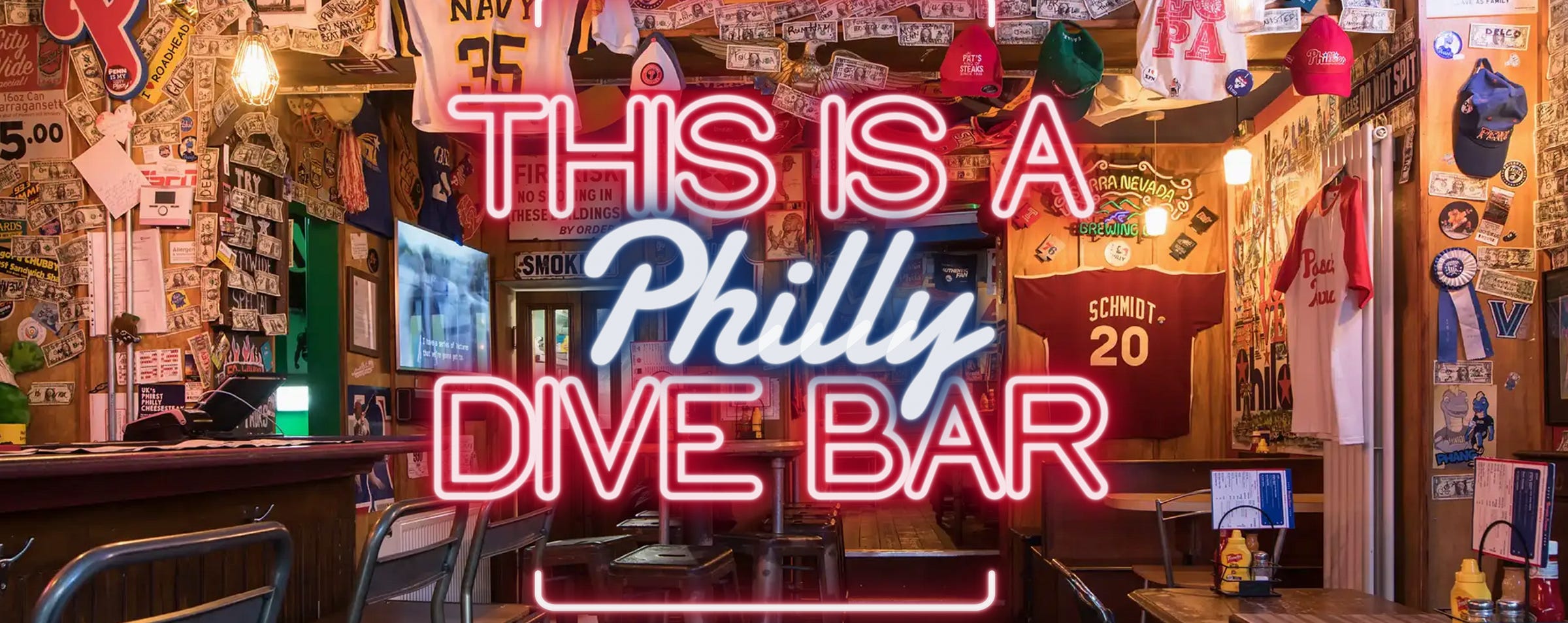A Conversation with the (Unofficial) American Ambassador to London
J.P. Teti, founder of multi-unit American restaurant & dive bar chain Passyunk Avenue
Last week, we wrote about Ben Franklin in Philadelphia and how, fresh from his London apprenticeship, he gathered a circle of friends and colleagues to form The Junto — likely America’s first true social club — a group whose influence rippled through early Philadelphia and the fledgling nation at large. And, of course, how our own Junteau pays homage to it.
It feels fitting, then, to follow up with an interview featuring Philadelphia’s current unofficial ambassador to London — my friend J.P. Teti, founder and CEO of the multi-unit American restaurant & dive bar chain Passyunk Avenue. You might even say he’s the city’s unofficial ambassador of Americana writ large. After all, Passyunk has at various times been ranked by National Geographic and TripAdvisor as the #1 American Experience in London.
J.P. is a perfect subject for our interview series because, like our other interviewees, he quit his long-time corporate job in his 30s to build something of his own — something that’s since grown to have a lasting and positive impact on so many.
His growing chain of “regional Americana-themed” sports dive bars is, in essence, exporting a slice of the American ethos to anyone abroad willing to indulge — one cheesesteak and pint of “Yunkling” at a time.
Much has been written about J.P. over the years, thanks in no small part to the trophies Philly’s sports franchises have been hauling in lately. Some of those trophies — and their champions — have been spotted at Passyunk Avenue locations themselves.
Think of the Eagles finally breaking through with that unforgettable Nick Foles Super Bowl win in 2018 over Tom Brady and the Patriots, then doing it again in 2025 with Jalen Hurts and Saquon Barkley over the Chiefs. The Phillies taking back-to-back NL East titles in 2024 and 2025. And of course, the deep postseason runs — like the Phillies’ trip to the 2022 World Series and the Sixers’ hard-fought playoff pushes — not to mention the recent Phillies-Mets game at London Stadium in June 2024.
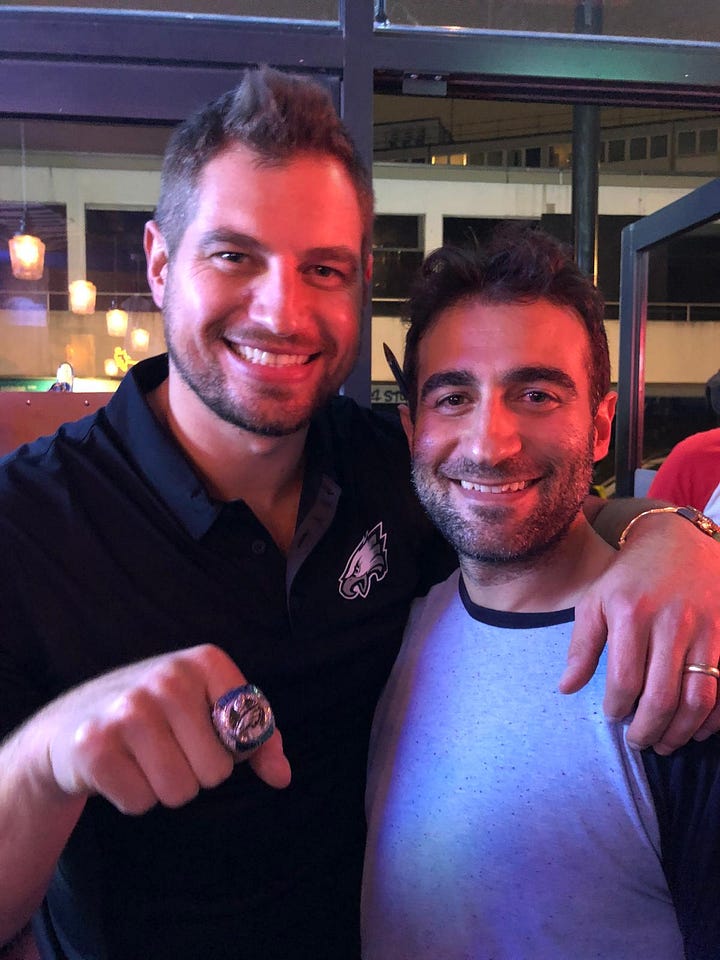

As you can read on the Eagles’ website (link), while studying in London in 2011 J.P. — born in Trenton to a deeply South Philly family — went out one night craving a cheesesteak with his friends, most of whom had never even heard of one. Assuming it would be easy to find — surely someone had imported the concept to the Old Empire, right? — but he came up empty. That night changed everything. From then on, he was determined to build a business to fix the situation.
The problem he soon encountered was the lack of an adequate supply chain in the country to make it happen. So what did he do? He built one from scratch. Unable to buy Cheez Whiz through the usual foodservice or retail channels in England, he first sourced cases from an American military base before shifting to an even more clandestine middleman in Europe. Eventually, he went full food scientist mode and three months later developed his own version — as close to Whiz as possible but with his own spin. Next came the famous Amoroso rolls, which also couldn’t be found in England. He went through half a dozen British bakers before finally finding one that could deliver the right bake. And then there was the literal meat of the matter. J.P. found a willing supplier across the Channel in the great agricultural empire of The Netherlands.
So in 2014, while still working his full-time corporate job (from which he would soon resign), J.P. opened his first venture — the precursor to the budding empire — a food truck at Old Spitalfields Market called Liberty Cheesesteak. It launched to much fanfare, particularly among nostalgic American expats yearning for some good old comfort food, as well as Londoners who just love a hearty, meat-and-cheese stuffed sandwich.
Eleven years later, that single food truck has evolved into five standalone brick-and-mortar bar-restaurants across London, plus the newest “Passyunk Play” concept adjacent to their flagship Waterloo location — complete with a batting cage, pool table, air hockey, and darts. There’s even the great story of their house beer “Yunkling.” When he had trouble importing Pennsylvania’s finest Yuengling (America’s oldest brewery) for his taps, he partnered with a local brewery to create their very own version. And now J.P. and his growing team have their eyes set on a European expansion across the channel.
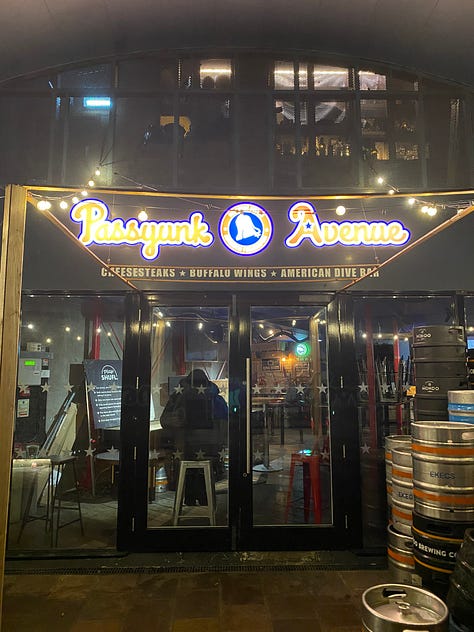
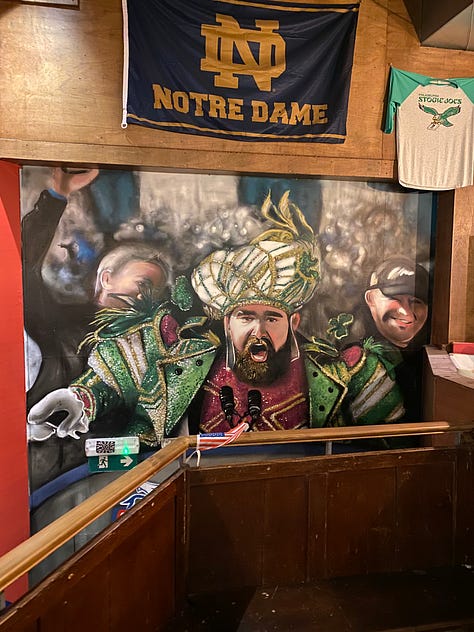
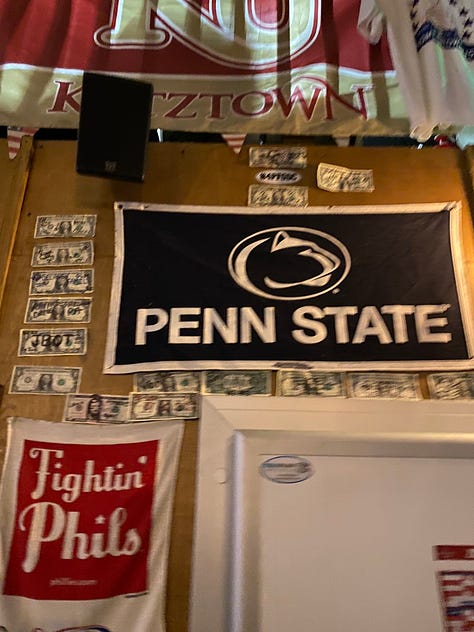
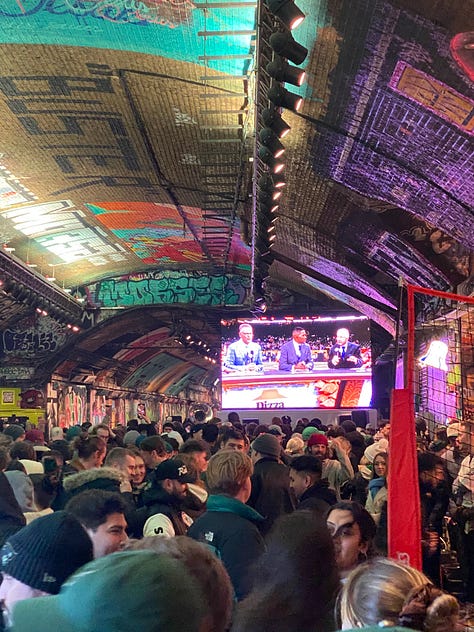
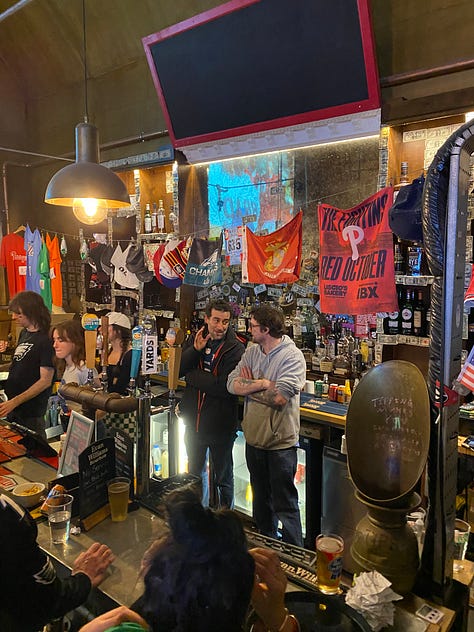
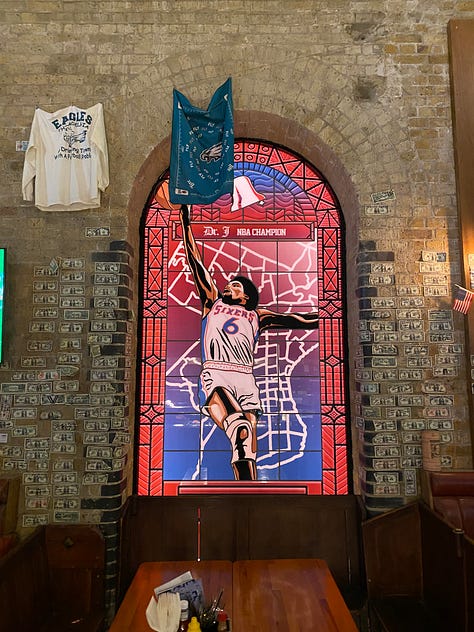
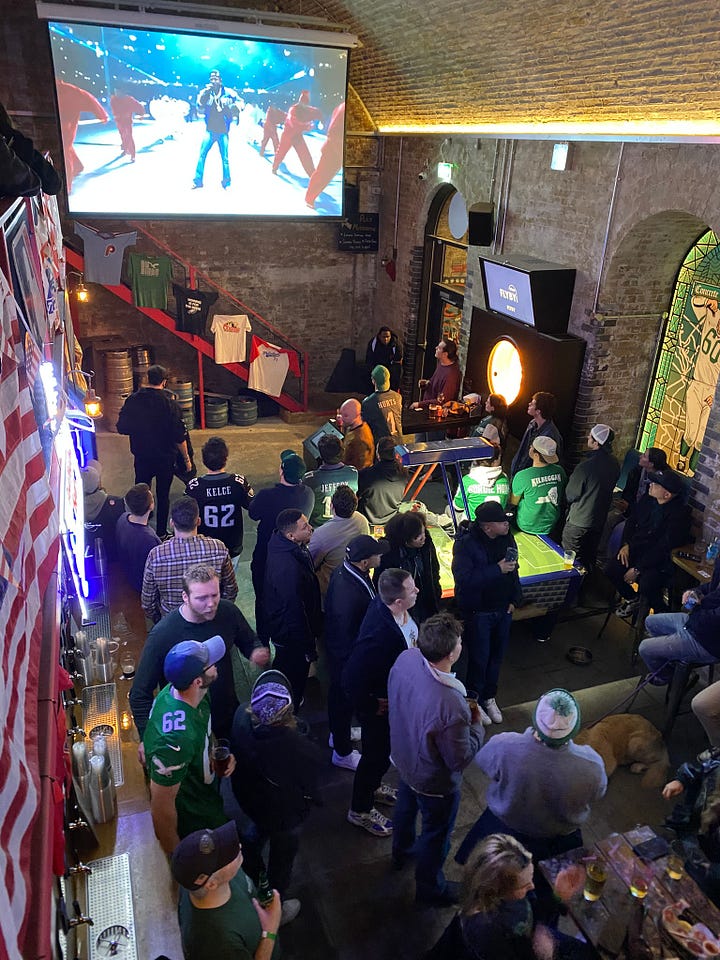
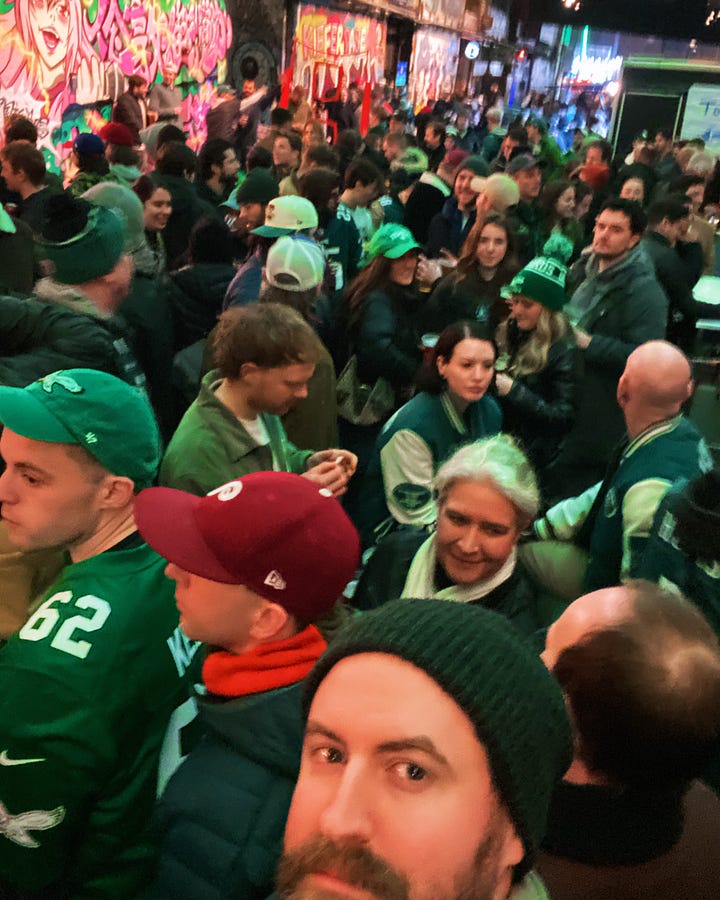
Over the years, especially lately, the spotlight has only grown brighter on J.P., his team, and the growing business. You can read (link) about how Jason and Travis Kelce showed up at Passyunk one day to record their podcast — Travis in town supporting his future fiancée, Taylor Swift, during her Eras Tour stop in London. And of course there’s the most recent New York Times piece (link) about the epic Passyunk Super Bowl party that essentially shut down the Waterloo Tunnel — which, naturally, ended in victorious pandemonium for Passyunk and the legion of green in every direction (I would know, I was there - check the bottom-right photo above).
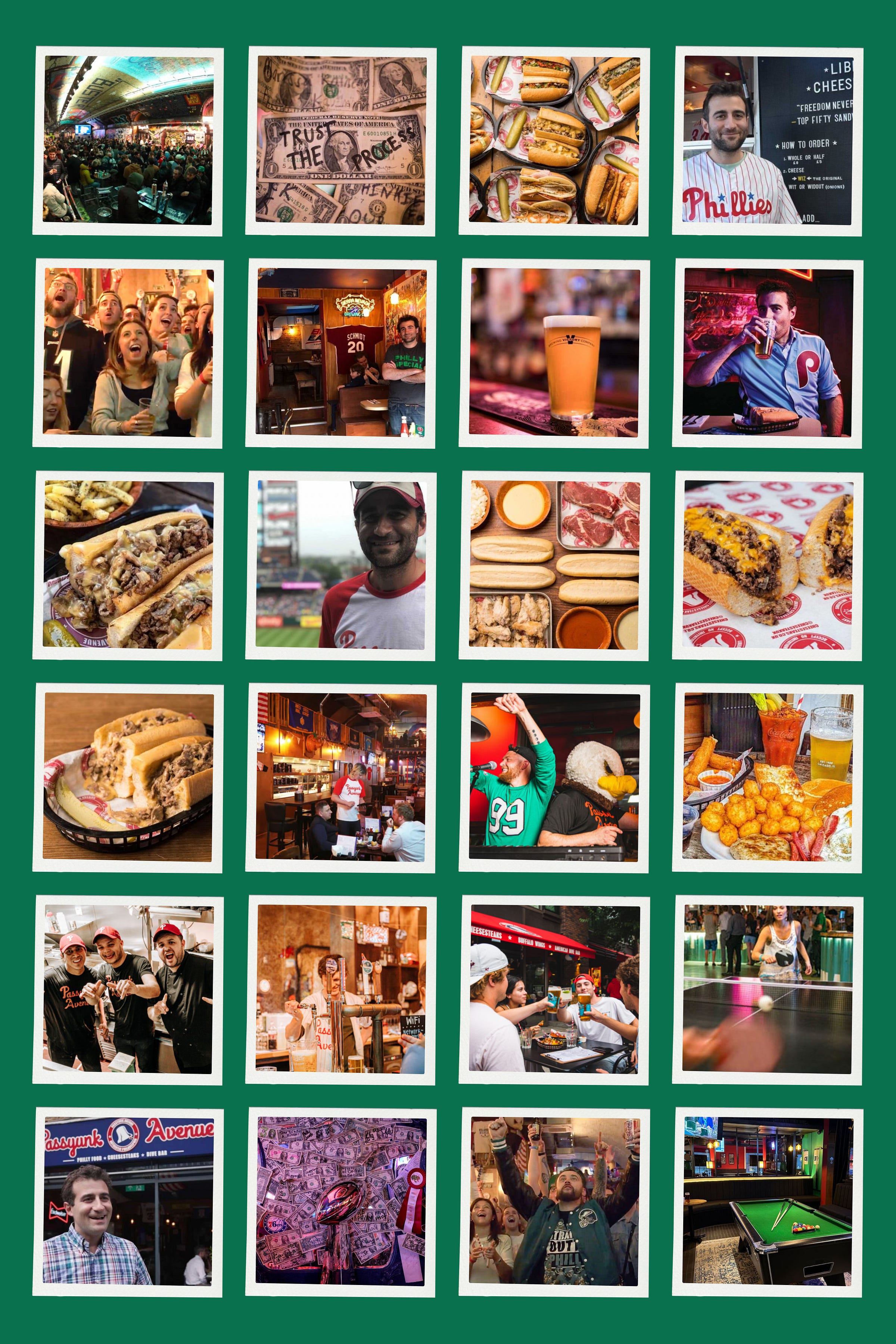
But what hasn’t been written about is J.P. the man himself — what drives him, his philosophy, his ambition, his family, and his views on entrepreneurship and designing an “intentional life.”
I’m proud to call J.P. a personal friend. As a fellow American in Amsterdam, having moved recently after more than 15 years in London, he embodies almost perfectly what The Junteau itself champions — the American “pursuit of happiness” ethos, entrepreneurship and independence, and the ongoing work of balancing family, health, and commercial ambition.
We hope you enjoy this deep, wide-ranging interview spanning the beginning, present, and future of Passyunk and its relentless founder.
Q: J.P., thanks for doing this. So you come from an Italian immigrant family in South Philly, grew up in Lawrenceville, NJ not too far away, and now you’re living all the way in Amsterdam, The Netherlands. Tell us about your early life and career. What were you doing?
A: Once upon a time, I was destined for a career in elected politics. I graduated undergrad highest honors with a degree in political science and was a high flyer. Then I parlayed a White House summer internship into a full-time staffer role after I graduated. So it was straight into my chosen field at the highest levels and I felt indestructible.
But those feelings of indestructibility quickly dissipated after a few years in the barrel of American politics. After my government stint, I sought some political experience on the campaign side and threw myself into several campaigns as a communications consultant. After one particularly bruising cycle where I literally spent every day, every hour, with a candidate running for a US Senate seat, it was clear to me that the goals I had for my personal life and those that a career in politics would permit were divergent.
So on this realization, I decided to tap out of politics in favor of private-sector work, which took me into the digital media space where I ultimately ended up working for Xerox in an overseas position running a division of the company in the Middle East and Africa. While I found this period of my life incredibly interesting — largely due to the territories in which I worked and the incredible people with whom I had the good fortune of associating — I experienced a growing sense of disillusionment. For as exciting and lucrative as my occupation proved to be, I came to wonder often about the consequence of what I was doing on a daily basis. I also felt that I was becoming accustomed to a certain standard of living that, in order to sustain, would require me to continue to toil in a field of diminishing fulfilment.
I had always harbored entrepreneurial ambition and my familial inheritance was one of entrepreneurship, so I decided to leave the safety and relative comfort of a job to pursue my own ventures, aware of the sacrifices inherent in such a choice, but not at all prepared for the loneliness and doubt that lay ahead.
Q: So we know you’re now leading and building Passyunk. How would you describe it in your own words?
A: Yes, I am the unlikely founder of a multi-site hospitality group and brand based in London and poised for European expansion. What we’re doing in presenting the best of regional American, ethnic idiosyncratic culture via immersive, experiential venues that seek to transport guests to the streets of South Philadelphia. The brand aspires to connect people to nostalgic Americana, by distilling core American values — not necessarily tapping into who we are at present, but presenting what we imagine and still believe America to be at its best, most optimistic and most attractive.
Q: What was the exact moment you decided you couldn’t stay on your old path?
A: When I literally asked myself if anyone would remember I was here if I died tomorrow. On my previous path the answer to that question was no, apart from family and some close friends. I wanted to do something consequential for society by building a venture that created fulfilment and delight both for those who worked alongside me to build it, as well as those who would consume the output of our efforts.
Q: Who was the first person you told about your plans? How did they react?
A: My wife was invariably the person who was on the receiving end of the frustration I experienced in my previous career. She would similarly hear all of the boasts I made about how I was going to right wrongs and change my trajectory. Over time, these boasts leaked out to others — close friends and family. My discontent and my threats to do something about them became so widespread that I feared if I did nothing then I would be branded a malcontent with no fortitude to make difficult choices. At this point, I had one final conversation with my then heavily pregnant wife — with our first child — and essentially asked for her blessing to leave my over-compensated, under-worked corporate job in favor of the vague outline of a new business I intended to create. She told me to go for it and I resigned the following Monday.
Q: How do your friends and family describe what you do now? Do they get it right?
A: My kids say that Daddy has restaurants that make great cheesesteaks and buffalo wings. Technically they’re right, but they slightly miss the nuance built into the essence of the brand — that the venues and food are just conduits for our unique interpretation of Americana that we hope many people will find attractive and inspiring.
On life, relationships & lifestyle —
Q: So you’re married with kids. How has your life or lifestyle changed shifting gears entirely from the corporate world to launching a hospitality brand?
A: Married with two kids aged 9 and 8. My career change has certainly enabled me to be far more present in our family life due to the flexibility of my schedule. I take the lead in many of our domestic responsibilities and, more often than not, I'm dropping off and picking up the boys from their school. I’ve become quite an accomplished youth football coach as well. Previously I wouldn’t have had the time to do most of this. So I may have sacrificed some level of financial gain, at least in the short or medium term, but I gained the flexibility to be a more engaged member of my family at a critical period of our family life. The value of this cannot be quantified in financial terms.
Q: Your wife told you to “go for it” in the beginning. Is she still on board?
A: My wife is the biggest supporter of the path we’ve chosen. She has been the emotional backstop, because there are days when you feel like it's all hopeless. Apart from continuing to finance the family with cash from a more "normal" job, especially in the early stages of my venture, my wife has functioned as our Chief Optimism Officer when no one else has been willing to take on that job. The role has been indispensable in the success we’ve had so far and, ultimately, it will be why this venture — apart from our children — will be the greatest, most lasting thing we’ve conspired to create together.
Q: How has your sense of identity shifted being an entrepreneur now for several years after grappling with your former political and corporate ambitions?
A: I’ve decided on a path that is not obvious and one that most people would be uncomfortable choosing. But as a result, I feel pride in the courage I was able to summon to do what I'm doing now. I find these attributes are attractive and inspiring to others and people start to seek you out for guidance. A benefit that I never anticipated was how much satisfaction I get from helping others who are on similar journeys to mine.
Q: What have you sacrificed?
A: I've sacrificed the concept of compartmentalization, which is something you don't even realize had value when you enjoyed it in previous lives. When it's your venture, compartmentalization doesn't exist any more. Your life and work and the meaning you derive from it becomes one and the same. It's always with you no matter where you are or what you are doing. The challenge becomes moderating the inherent highs and lows while maintaining relative perspective about the ultimate importance of this venture and your life in general.
Q: What do you or the family do for fun? How is that different now versus in the past?
A: Our lives are all so busy now that we prefer to get away to quiet locations away from activity and too many people. We like being among nature as I think we find it all very grounding and perspective-giving. Anywhere there are hot tubs and saunas is a bonus.
Q: Any vacations recently or coming up? Can you relax knowing you have a business running?
A: Your venture is always on your mind. That is the reality. However, my focus from the very earliest stages was to imagine the business I wanted to build and construct, perhaps prematurely, the organization that would be required to run that business. As such, I've spent much of the formative years of the business focused on building and investing in the organization that I believe will be capable of achieving the goals we set for ourselves. You are never entirely at ease, but leaning on a capable organization of dedicated, aligned people goes a long way to giving you comfort.
On ownership realities —
Q: What are the claimed positives about business ownership that are a bit misleading?
A: The idea that entrepreneurship equals freedom with no strings attached is bogus. You can't escape the gravity of…
…regulation, people management and the fundamental need to make a living. Yes, it's freeing to have more control over decisions that affect your future, but you no longer have the back office that perhaps you relied on in a more normal job. You are your own back office and the learning curve is steep at times, particularly when it comes to issues of regulatory compliance or finding people to buy what you're selling. It's up to you entirely, which is liberating and daunting at the same time.
Q: And some true but maybe underappreciated positives?
A: The greatest part about entrepreneurship is to, every once in a while, seek the high ground and, as objectively as possible, gaze on what you have created, knowing that nothing you see before you would have existed if not for you. It's fortifying, motivating and reassuring.
Q: What’s the most unexpected or painful thing you’ve had to learn hands-on?
A: You learn that regulation favors the private individual at the expense of the commercial entity. It is often disproportionate, not well considered and totally disrespectful of an entrepreneur's capital and ingenuity. In many instances an offending regulation was conceived in good faith to address a societal concern, but when the regulation meets reality the result is an overreach that creates imbalance and damages the prospects of prosperity.
Q: What number keeps you up at night?
A: In the earliest stage, revenue and its subsequent growth, as it is the one accurate reflection of whether enough consumers value what you do and are willing to pay for it. Without this, nothing else matters.
Q: If your journey was a movie, what’s the one moment you’d replay in slow motion?
A: The first time I ever raised external capital, so I could study what about my affectation exuded desperation or lack of confidence that resulted in my acceptance of suboptimal terms.
Q: How do you know when it’s time to call it a day, at least personally?
A: When the nauseous, anxiety-driven feeling in my stomach renders me incapable of clear thought.
The highs, lows, and turning points —
Q: What’s been the lowest low and the highest high for you over the years?
A: The lowest low was probably before I even opened my first venue. I was being attacked by local residents who impugned my integrity and made outrageous claims about my intentions and how they would foster a degradation of the community. The highest high was when, nine months after I opened, the Philadelphia Eagles arrived at my venue with the Super Bowl trophy.
Q: Was there anything that risked or almost crushed the business early on?
A: Well, a once-in-a-100-year global pandemic was not an optimal time in which to try to operate a fledgling hospitality concept. The silver lining from this experience was that it made us very good, very quickly at managing cash flow and embedded once and for all a culture of innovation that helped our brand stay relevant in the minds of consumers through this period.
Q: If you exited tomorrow, what part of the journey would you miss most?
A: No matter how insignificant, I learn something new every day — whether operational, interpersonal, financial, commercial or about myself. I would have to find a new source of consistent inquiry to keep my aging brain from atrophying.
Q: What’s a story you hope people tell about you long after you’re gone?
A: I recently wrote and published a children's book called The Legend of Passyunk Pete that tells the story of my great-grandfather Pietro and his journey from a tiny Italian village to a more prosperous life as an industrious and eager new American in Philadelphia. I want people to look back on my accomplishments and say that he honored the legacy of his ethnic inheritance. His ambition, ingenuity, passion and desire to contribute to society — to leave it better for those who come next — embodies the essence of his people, who often had nothing more than heart, faith and belief in themselves to make things better.
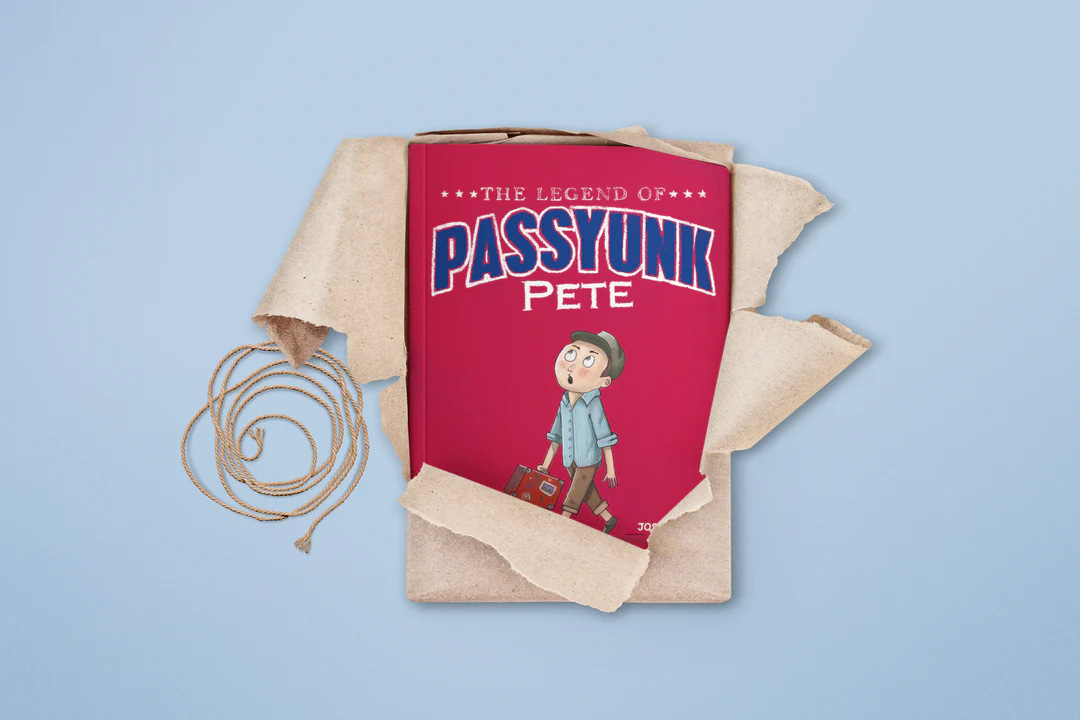
On inspiration and admiration —
Q: Does anyone in particular inspire you in business?
A: There are people that I've met during my entrepreneurial journey that I've described as having a "nose for money," meaning that they're extremely commercial in all that they do and are seemingly always able to cut the best deals for themselves and their businesses. I don't self-describe as having a "nose for money"; conversely I think my skill set is more creative and interpersonal, so I rather admire overtly commercial operators.
Q: Which other companies or brands do you admire more now that you’re in the trenches?
I admire all upstart enterprises with no or limited access to capital that have to succeed based on the fundamental merits of a business idea and the ability of their organizations to operationalize this idea in a way that is commercially viable. Self-evidently, I am less impressed by businesses that are able to foist themselves on the buying public by virtue of their ability to access deep pools of capital.
Q: Do you think entrepreneurs are born or made?
A: I think entrepreneurs are born in that I suspect there are naturally occurring personality traits more likely to be linked with entrepreneurship. You are either endowed with these traits or you are not, and this goes a long way to predicting the willingness of an individual to suffer the vagaries of entrepreneurship, if they even allow themselves to embark on that journey to start.
Q: What have you learned about leadership and management that you couldn’t have before?
A: Leadership is a grassroots initiative where the real power to influence people is derived from the willingness of others to transfer some of their human energy to you because they trust that you are better placed to do more with it for the benefit of themselves as well as everyone else in their community. You are borrowing, with explicit consent, the hopes and aspirations of others in order to elevate the group and the prospects of everyone associated with that group. In theory, it's much simpler than we've ever been led to understand, but the gravity of collective aspiration makes the exercise of effective leadership much more complex in practice.
On tools, tech, and processes —
Q: Any interesting technologies, software, or processes you’ve recently adopted? How did it go?
A: We've just updated our POS software for apparently better integration with our stock management and booking platforms. Tangible benefits yet to be realized.
Q: What piece of equipment, software, or even a random tool has become oddly essential to your daily life?
A: I just need my iPhone. I can access everything I need and can contact anyone as required. Downside of having the iPhone with you at all times is you've got a superstore of distractions at your fingertips too.
Q: Do you think most tech or software is overrated or underrated? Why?
A: I think tech is overrated as it is often presented as the panacea. Tech just enables good or bad business practice that already exists. If you're good at something as an organization and committed to being good at it no matter what, tech can function to amplify your efficiency — but this works in the other direction as well.
On career paths and alternatives —
Q: Would you ever go back to a W2-type job or to work for someone else? If so, how would your approach be different?
No, if it comes to this, I'm going off the grid and opting for a purely subsistence lifestyle.
Q: What would you have done differently, knowing what you know now, during your initial career or journey, say, say 5, 10, or 15+ years ago?
A: If I weren't hell-bent on building and scaling a valuable brand — and if I were actually good at or interested in hospitality operations — I would have opened one venue, owner-operated for 20 years and quietly made a really nice living. Alas, I'm not cut out for hospitality operations and one small site doesn't match my ambition.
Q: If you were to jump into another business or add-on, what sectors interest you?
A: I've always been interested in farming and I find manual labor gratifying. I would probably disappear into rural Italy, acquire a few hundred acres and harvest olive trees.
Q: Would you want your kids or mentees to follow in your path?
A: I want my kids to develop perseverance and a strong sense of self-reliance. If you're willing to endure challenge and setback and you fundamentally believe in yourself, you can achieve anything you imagine. The only limit to what you can achieve are the limits of your imagination.
On health and personal habits —
Q: What do you do to stay healthy or active?
A: I train for and compete in triathlons. I like the diversity of the interdisciplinary structure and, as I age, it's a good way to maintain strength and general fitness.
Q: Is your personal life better, worse, same, or just different since launching Passyunk?
A: Better, as I have more time to invest in my family and my health and wellness.
Q: What’s the mantra or phrase you repeat to yourself most often?
A: “Fuck” — it's what I say in my head constantly before I start figuring out what to do next!
On money and investing —
Q: Are you investing at all outside your business?
A: Not really apart from some legacy retirement accounts, junior accounts for the boys and property. I've got limited financial resources and, with those resources, I am backing myself, so I guess it stands to reason that I think I'm a better bet than others with the money I have to spend.
Q: Do you believe you've walked away from significant financial upside to pursue this? Was it worth it?
A: In the short and medium term, yes. I had a very strong salary, bonus structure and options program. I was tracked on the high-potential executive program and I passed up several full expat overseas assignment opportunities. You can value all of that; it is less than what is in my bank account currently. You can't value the flexibility and fulfilment I have currently. Furthermore, the potential upside from exiting my business could be considerably more than the pre-entrepreneurial path.
On culture, media, material, and personality —
Q: What are some cool or interesting products you bought recently? Do you collect anything? Tell us about your material life... vehicles, house, things, etc.
A: I'm actually not a huge consumer. I don't really spend money on much apart from streaming services for music and sports content, specifically MLB and NFL, and one news subscription. I'm a bit of a stickler for good coffee and fresh juice, so about five years ago I invested in an incredible espresso machine and a manual fruit juicer. I use both items every day, so dollar for dollar they are the most valued and efficient material expenditures I've probably ever made.
Q: What has your interest or attention lately — a book, movie, show, podcast, or even a social media post? Why?
A: I just finished Anthony Bourdain's Kitchen Confidential. It was a gift from one of my managers and I think it was meant to make me feel better, but it all hit too close to home and left me welling up with anxiety. It's one of the reasons I can't watch the celebrated series The Bear.
Q: What projects, hobbies, or passions outside of work do you engage in and make time for?
When I'm not discharging domestic responsibilities, I retreat to following Philadelphia sports via podcasts or a live-game radio broadcast because I find it very soothing and it makes me feel a bit closer to home. In any remaining spare time I train for my triathlons.
Q: Are you involved in your community? How does that fit into your life now?
A: For my sins, I got myself elected to the Board of Directors of a traditional English members club in London. It's straddling the ancient and modern worlds and can't really figure out a way forward, or whether it wants to go forward at all. It's involved a lot of abuse and not much gratification. I look forward to the end of my term.
Q: If your life, business, or career journey had a soundtrack, what song would you choose?
A: "That's The Way That the World Goes Round" — John Prine
Finally, on happiness and the future —
Q: What seeds are you planting now that you hope will bear fruit in 3 to 5 years?
A: I'm learning about how to be a really effective youth football coach. My aptitude for leading people to coalesce around achieving goals has been critical in my initial modest success, but tactically and strategically there is so much I don't know about football, and my motivational speaking will only get me so far. I'm studying the game a bit more seriously now and in five years I could be the Dutch answer to Ted Lasso. Beyond that, my focus is almost entirely on my main enterprise and my family because I view these as most worth my effort to cultivate.
Q: Do you feel like you’re building momentum? What would a turning point look like?
A: The momentum has been built. Now I’m riding the wave and course-correcting as necessary.
Q: What does “success” mean to you now?
A: Success to me is impacting the lives of others so they remember you existed and valued the experience of crossing paths with you during the short time that we inhabit the planet together. My sense is that if you focus on living a high-value life in the service of others, you will ultimately enjoy good fortune and your material needs will be satisfied.
Q: All told, are you happy?
A: 25 years ago I attended university in the UK for a year and thus began my wanderlust and determination to live an international lifestyle. It took me 9 years to return to the UK, but I haven't lived back in America since and that was 17 years ago now. When I was 19 years old, I imagined the life that I've built and sometimes I reflect on whether it is everything I thought it would be when it was just a dream. It's exceeded any naive expectation I may have had and the process of building this life has taught me a lot about myself.
I set out to create something from an idea, battled doubt and adversity and made it through to the other side. I can say with certainty that had I not had the experience as a 19-year-old international student in the UK, I wouldn't be living internationally now and I'm not sure I would have heard or responded to the entrepreneurship calling when it finally did come. The process of building a life from that which I imagined as a teenager fortified me with reserves of perseverance, adaptability and courage — all foundational attributes for entrepreneurship.
Am I happy? 25 years after I suspected an alternative path might be right for me, I live in Amsterdam, founded a business, built a brand, and have a joyous and sustaining family. I take my boys to and from school most days and I get to coach my son's football team. Things could be worse.
VEO: Truly inspiring story, life, and career. Thank you. I really appreciate you taking the time.
J.P.: Thank you. This was fun, happy to do it.



